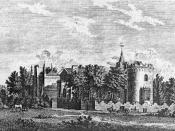Dark power! With shudd'ring, meek submitted thought
Be mine to read the visions old
Which thy awak'ning bards have told,
And, lest thou meet my blasted view,
Hold each strange tale devoutly true.
-William Collins, Ode to Fear
What is Gothic Literature?
During the last decades of the eighteenth century, England found itself in the midst of a societal unraveling. The philosophies of Shaftsbury, Adam Smith, and David Hume, which for most of the century had provided the intellectual classes with theories of action and motivation that justified their self-interested behavior began to reveal themselves as insupportable. The contradiction between the English ideology in which "individual desires and collective needs participated in perfect reciprocity" (Poovey) and actual economic and political conditions began to surface. Incidents like the Gordon riots in 1780 (as well as the utterly terrifying reality of complete Revolution just across the Channel) revealed a rupture in what had been thought of as the time and place of "the well-bred gentleman".
It is out of this social climate that the Gothic novel grew: a new and fearful genre for a new and fearful time. The spectre of social revolution is manifest in the supernatural "spectres" of the Gothic: a crumbling way of life emerges as a crumbling and haunted Gothic manor; the loss of English social identity becomes the Gothic hero or heroine's search for identity. The Gothic is often criticized or even dismissed for its overly melodramatic scenarios and utterly predictable plots, but the incredible popularity of the genre in the eighteenth and early nineteenth centuries, as well as the "comeback" of gothic narratives within the past two decades, points to a resilience that cannot be overlooked.
The development of the Gothic Novel from the melancholy overtures of sentimental literature to the rise of the sublime in...



Wow. I'm impressed.
Great essay, from your strong beginning all the way to the end - thanks for the referencing.
1 out of 1 people found this comment useful.